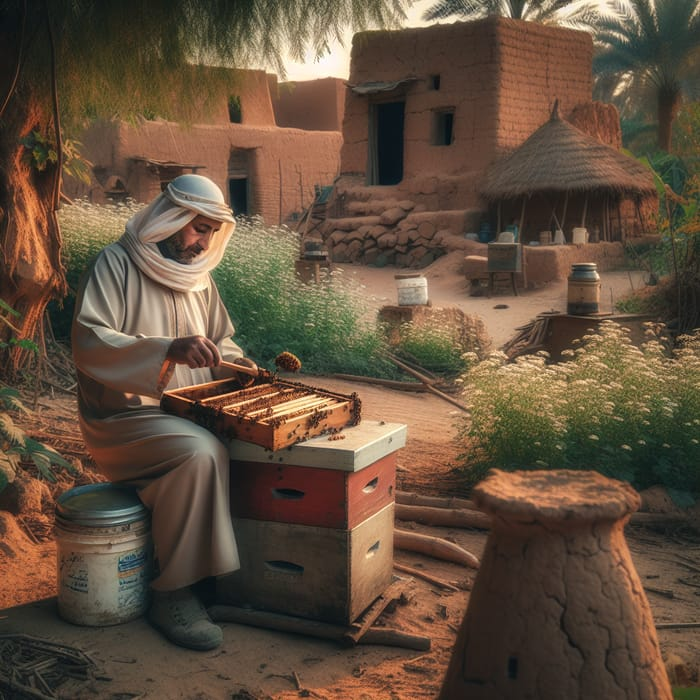- Published on
The Sweet Tradition of Moroccan Beekeeping in the Atlas Mountains
- Authors

- Name
- Adil ABBADI
Introduction
Nestled in the heart of the Atlas Mountains, traditional Moroccan beekeeping has been a thriving practice for generations. The region's unique combination of fertile valleys, lush forests, and abundant flora creates an ideal environment for apiculture. For centuries, Moroccan beekeepers have honed their skills, passing down techniques and secrets from father to son, to produce some of the world's finest honey. In this article, we'll delve into the cultural significance, traditional practices, and modern relevance of Moroccan beekeeping in the Atlas Mountains.

- Cultural Context
- Traditional Significance
- Modern Relevance
- Cultural Preservation
- Conclusion
- Cultural Call-to-Action
Cultural Context
Beekeeping in Morocco dates back to the 12th century, when the Arabs introduced the practice to the region. Over time, the art of apiculture merged with the indigenous Berber traditions, resulting in a unique blend of techniques and customs. In the Atlas Mountains, beekeeping has long been an integral part of the local economy and culture. Beekeepers, known as "rabbad" in Arabic, are highly respected for their skill and dedication to preserving this ancient tradition.
Traditional Significance
In traditional Moroccan beekeeping, bees are kept in wooden hives, often decorated with intricate carvings and symbols. The hives are typically placed in apiaries, strategically located near nectar-rich flora, such as lavender, thyme, and eucalyptus. Beekeepers use smoke to calm the bees, allowing them to inspect the hives and harvest honey. The honey, known as "asal" in Arabic, is prized for its exceptional quality and flavor, with different regions producing distinct varieties.

Modern Relevance
Today, Moroccan beekeeping faces challenges such as climate change, pests, and diseases. However, many beekeepers are adapting to these changes by adopting sustainable practices and modern technologies. The use of mobile phones and digital platforms has improved communication among beekeepers, enabling them to share knowledge and best practices. Additionally, initiatives such as beekeeping cooperatives and training programs are helping to preserve traditional techniques while promoting innovation and entrepreneurship.
Cultural Preservation
Efforts to preserve traditional Moroccan beekeeping are underway, with organizations such as the Moroccan Association of Beekeepers and the Atlas Mountains Beekeeping Cooperative working to promote sustainable apiculture practices. These initiatives aim to protect the region's unique bee species, preserve traditional techniques, and support local beekeepers. Furthermore, the Moroccan government has established programs to promote apitourism, allowing visitors to experience the art of traditional beekeeping firsthand.

Conclusion
Traditional Moroccan beekeeping in the Atlas Mountains is a testament to the region's rich cultural heritage. This ancient practice has been passed down through generations, with beekeepers continuing to adapt and innovate while preserving the traditional techniques and customs. As we look to the future, it is essential that we support and celebrate this vital part of Moroccan culture, ensuring the sweet tradition of beekeeping continues to thrive for generations to come.
Cultural Call-to-Action
Join us in celebrating the cultural significance of Moroccan beekeeping by exploring the Atlas Mountains, visiting local beekeepers, and tasting the exceptional honey produced in this region. By supporting local beekeepers and promoting sustainable apiculture practices, we can help preserve this ancient tradition for future generations.
